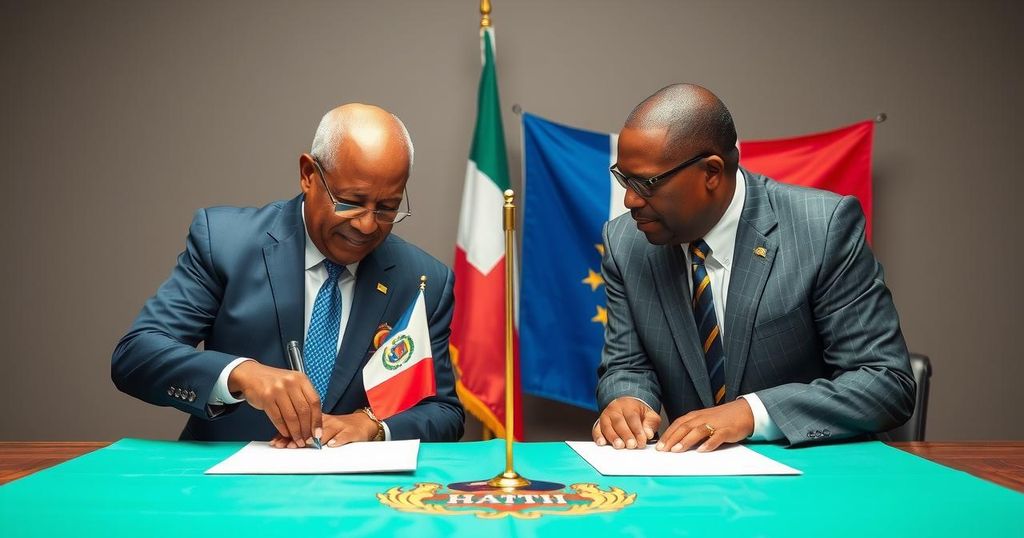Haiti and Benin Sign Cooperation Memo to Strengthen Diplomatic Ties

Haiti and Benin signed a five-year memorandum to enhance diplomatic ties and cooperation across various sectors such as security and education. While troop deployments from Benin to Haiti have not occurred, they remain a possibility in the future, particularly following a pledged commitment to support stabilization efforts. The agreement may indicate potential shifts in Haiti’s international alignments post-crisis.
On Wednesday, Haiti and Benin formalized their diplomatic relations by signing a memorandum aimed at fostering collaboration on various international issues. This notable agreement was finalized during a meeting between the respective foreign ministries of Haiti and Benin in Cotonou, under the theme of “strengthening bilateral ties and promoting Pan-African and Caribbean relations.” Haiti’s Foreign Minister, Jean-Victor Harvel Jean-Baptiste, endorsed the five-year memorandum, which focuses on enhancing cooperation in security, education, culture, diplomacy, and scientific research.
The Haitian foreign ministry expressed enthusiasm for the memorandum, underscoring the shared interests that bind the two nations. Subsequently, a visa waiver agreement was also established between CARICOM and Benin to facilitate travel between the regions. While the memorandum does not explicitly mention troop deployments, the inclusion of “security” cooperation could suggest potential military collaboration in the future, contingent upon a more detailed agreement or amendment to the current understanding.
In early 2024, Benin had pledged to dispatch 2,000 troops to Haiti as part of a multinational initiative aimed at combating gang violence and restoring stability, spearheaded by Kenya with support from the United Nations. This commitment was publicly affirmed by U.S. Ambassador to the UN, Linda Thomas-Greenfield, during a CARICOM gathering. As of January 2025, however, Benin has not yet deployed its forces due to logistical hurdles and ongoing internal considerations. At present, the multinational force comprises approximately 590 personnel from various nations, including Kenya, Jamaica, and Guatemala. Discussions remain ongoing regarding enhanced support for Haiti’s security initiatives.
Amidst these developments, the memorandum prompts contemplation about Haiti’s potential future alignment. Should order be reestablished, Haiti may lean towards closer ties with African nations, potentially shaping a new diplomatic landscape that diverges from traditional Caribbean affiliations.
The signing of the memorandum of cooperation between Haiti and Benin marks a significant step in diplomatic relations between the Caribbean and African nations. Haiti, grappling with ongoing security challenges and gang violence, seeks international support for stabilization efforts. The involvement of multiple nations, including those from Africa, is crucial as they mobilize peacekeeping forces to address the crisis in Haiti tightly intertwined with regional dynamics. The memorandum establishes a broad framework for various cooperative efforts that could extend beyond immediate concerns, fueling curiosity about future political and military alignments.
In summary, the recent memorandum signed between Haiti and Benin underlines a mutual commitment to bolster bilateral relations across multiple sectors. While troop deployments have yet to occur, and the memorandum itself does not specify military cooperation, potential future collaborations in security issues may arise. As regional dynamics continue to unfold, the prospect of Haiti aligning more closely with African nations represents a significant shift in international relations, potentially reshaping its diplomatic landscape in the years to come.
Original Source: www.thestkittsnevisobserver.com








